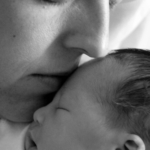Australian researchers have developed a cognitive behavioural therapy (CBT) treatment intervention for antenatal depression and anxiety. Beating the Blues Before Birth, to be delivered as individual therapy, was adapted from a 12-session group intervention for postpartum depression previously developed by Milgrom and colleagues (Milgrom et al. 1999, 2005). Interestingly, this intervention was modified for individual therapy because it was so difficult to recruit patients for group treatment during pregnancy. In this population, scheduling often presented significant problems, as did accruing an adequately sized group in a short period of time to allow for completion of treatment prior to delivery.
The Beating the Blues Before Birth intervention consists of 8 one-hour treatment sessions of 1 hour conducted weekly. A structured manual was used to ensure content was delivered consistently and could be easily replicated elsewhere.
The feasibility study which included 25 women yielded promising results for adherence, acceptability and improvements in depressive symptoms and anxiety. They then followed up with a randomized controlled trial (RCT) in which 54 women were randomized to receive either CBT or treatment as usual (TAU). The participants were less than 30 weeks pregnant and had been identified by midwives as being depressed or had scored ?13 points on screening with the Edinburgh Postnatal Depression Scale (EPDS). At baseline, the Composite International Diagnostic Interview was used to confirm a DSM-IV diagnosis of a depressive disorder. Women completed the Beck Depression Inventory and Beck Anxiety Inventory at baseline, after treatment and at 9 months postpartum. Women in the TAU group received case management by midwives and were referred for mental health services as needed.
The Results:
Following treatment, depression scores dropped, on average, from the ‘severe’ range (BDI-II=30.07) to the ‘minimal’ range (BDI-II=12.81) in the intervention group, but the drop in the control group was more modest (BDI-II 30.77 to 18.42). On average, anxiety decreased from the ‘moderate’ range (BAI=22.37) to the ‘mild’ range (BAI=10.40) in the intervention group, but remained relatively elevated in the control group (BAI 20.59 to 17.38). In addition, improvement in depression scores in the CBT group showed a dose-response relationship with the number of treatment sessions attended. Improvements in depression were maintained at 9 months.
By the end of the treatment period, two women in the intervention group and four women in the TAU group reported using an antidepressant. Ten women receiving TAU and 5 women in the intervention group reported that they had received mental health treatment outside of the trial.
At nine months, maternal and infant outcomes were assessed. The Ages and Stages Questionnaire (ASQ-3: Bricker and Squires 1999; Squires et al. 2009) were used to measure infant outcomes. The ASQ-3 is a parent-completed questionnaire for evaluating the developmental progress of young children and infants. The Ages and Stages Questionnaire Social Emotional (ASQ-SE: Squires et al. 2002) was used to assess social and emotional competence.
In terms of infant outcomes, the strongest treatment effects were seen in self-regulation and in three infant behaviour subscales: ‘high intensity pleasure’, ‘negative affectivity and ‘falling reactivity/rate of recovery from distress’ (a measure of stress reactivity). These effects were significant even when postpartum maternal depression and anxiety were controlled for.
The Take-Home Message:
While this is a small pilot study, it was large enough to show that a brief CBT-based intervention is superior to treatment as usual for antenatal depression and anxiety. The study was well-designed and used well-established instruments for assessing efficacy. What is also exciting is that while many studies using psychological interventions for the treatment of perinatal depression have focused on populations of women with milder illness, this study included women with more severe illness. In this study, baseline scores on the BDI-II averaged greater than 30 points, reflecting samples with ‘severe’ depressive symptoms, and most had a DSM-IV diagnosis of major depression. Thus, this sort of intervention might be appropriate for women with a wide range of symptom severity. (Although it should be noted, that two of the women in the intervention group were also taking antidepressants.)
In addition, this is one of the few studies (probably the first) to report on infant outcomes following treatment of antenatal depression and anxiety. Although the sample size was small and was not powered to definitively evaluate the impact of maternal treatment on infant outcomes, the children of mothers in the intervention group appeared to have better scores on tests of early development and behavior.
Ruta Nonacs, MD PhD
Milgrom J, Holt C, Holt CJ, Ross J, Ericksen J, Gemmill AW. Feasibility study and pilot randomised trial of an antenatal depression treatment with infant follow-up. Arch Womens Ment Health. 2015 Oct;18(5):717-30.








Leave A Comment